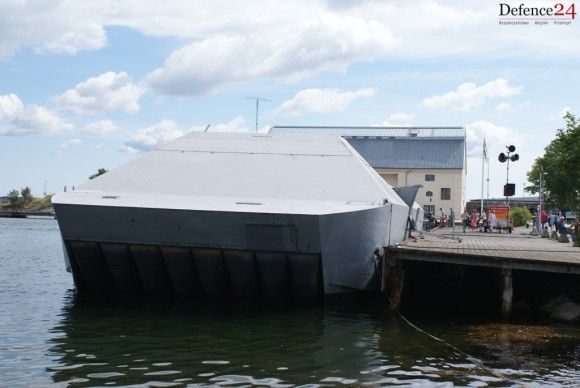Armed Forces
JASSM program for Poland enters crucial phase
There will be a review of the JASSM implementation program for Poland in early 2016 - Joseph Breen, Business Development Director at Lockheed Martin’s Missiles and Fire Control told Defence24.pl. This is related to the already concluded contracts for a majority of the program’s components, worth approximately USD 250m, which includes not only the purchase of the missiles, but also a deep modernization of the Polish F-16s and personnel training.
There is no official decision yet, but at the beginning of 2016, most likely in January, there will be a Program Management Review, the purpose of which will be to coordinate actions. (...) This is necessary due to the number of players and systems involved in the project. The program is associated with Sniper targeting pods, mission planning, personnel training, JEMS system (JASSM Enterprise Management System) and the modernization of the F-16, including both software and onboard systems. This is a huge and complex project.
As the Lockheed Martin representative pointed out, the contract for the purchase of AGM-158A JASSM missiles is just one of the many agreements concluded within the broad program of modernizing and retrofitting of the Polish F-16s. This program, worth USD 250m, negotiated between Poland and the US in the framework of an FMS (Foreign Military Sales) procedure, consists of contracts concluded with individual contractors and producers within the broader procurement for the US Armed Forces.
Five-six months ago, everyone, including the Polish side, agreed that we need to create a joint plan, including the dependencies and relationships between all these components. In January, there will be an appropriate moment to review the implementation of these actions, because we know that agreements have been concluded on the Sniper pods or with Lockheed Martin Aero, concerning airframes. Work is ongoing. We are convinced that everything is working well.
The US administration has divided the whole into three separate phases in which the agreement was negotiated. The first phase was contracted with Lockheed Martin in June this year. It was an official agreement to start work on the software for Poland. The second phase involves the integration, training, and several other contracts related to the concluded Polish-American agreement. Negotiations on this issue were led by Lockheed Martin and the US government, and a preliminary agreement was concluded in early November.
With regard to the third phase, an agreement was also already concluded, since it includes among others the JASSM missiles delivery. This year, Lockheed Martin and the US Air Force also negotiated the conditions of purchase and the price of two missile supply lots: the 13th and 14th lots from which all the JASSMs ordered by Poland will come from.
Lot 14 is an important point not only in the "Polish contract" but in the history of the JASSM program, because it is the last lot containing AGM-158A and AGM - 158B missiles. According to the plans, starting from lot 15, only AGM-158B JASSM-ER with a range increased to over 900km, will be produced. They are currently only integrated on the B-1B Lancer aircraft, but in the future, they will also be integrated on the B-52H bombers, as well as the F-15 Eagle and F-16 Falcon multirole fighters. Interest in acquiring JASSM-ER has also been expressed by the Polish Ministry of National Defense.
Negotiation of several contracts at the same time speeds up the process and reduces costs, since each bid means a lot of work, man-hours by lawyers and experts, and generates a lot of documents. (...) With the contract for lot 14 of JASSM, in which the majority of Polish missiles are found, the next phase of the Polish program was closed. Lot 14 is now a production option for this year's production lot 13. It can be contracted based on negotiated conditions later this year or next year. But it no longer needs to go through the whole process of negotiations, which simplifies things and helps to reduce costs.
However, at the present moment, a more important issue is starting the modernization of the Polish F-16s to the most recent standard for among European users of these aircraft, that is M6.5. The cost of this operation represents a significant part of the value of the whole contract, signed in December 2014.
The work that will be carried out on the F-16 aircraft will mainly include the mission computer, electronic warfare systems, the new identification or foe (IFF) system, operating in mode 5 standard and more jam-resistant GPS navigation module. The latest variant of the Sniper pods will also be installed on the Polish fighters.
The modernization of the Link 16 data exchange protocol is designed to enable faster transmission and increase the situational awareness of the crew and security of communication. The idea is that it will also allow the Polish fighters to operate in NATO’s network-centric battlefield management systems. The weapon suite available for the Polish F-16s will also be extended to new types of missiles, not just AGM-158A JASSM, but also the guided EGBU-12 and SDB as well as air-to-air AIM-120D and AIM-9X. The modernization work will be done starting from the second half of 2016 at the rate of two aircraft per month.
We, as Lockheed Martin, cannot comment on the contract value or the price of the missiles. It is a matter of agreement between the Polish government and the US government. But it is important for us to say that what began in the Polish media as a purchase of 40 missiles for USD 500m, has changed into half that sum for the entire modernization program of the Polish F-16s.

